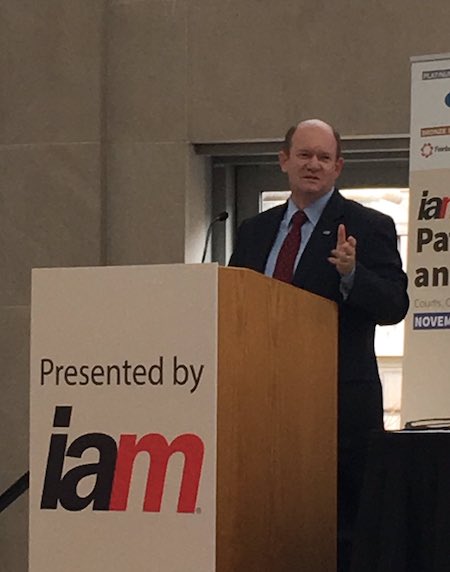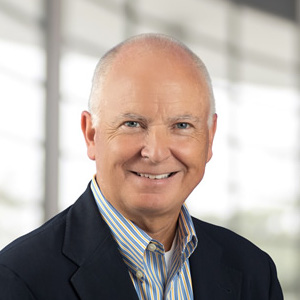 On account of Gene being temporarily out-of-action due to back surgery, he tossed me some assignments in the “Press” arena. He asked if I would cover and report on the recent IAM Conference (11/14/27) in D.C. I will summarize both the Keynote and Panel presentations in separate articles.
On account of Gene being temporarily out-of-action due to back surgery, he tossed me some assignments in the “Press” arena. He asked if I would cover and report on the recent IAM Conference (11/14/27) in D.C. I will summarize both the Keynote and Panel presentations in separate articles.
Joe Matal, Deputy/Acting PTO Director, gave the opening (breakfast) keynote for the conference. He gives the impression of a solid back-up QB for an NFL team. That is, he tries not to lose the game coming off the bench. Hence, his talk was somewhat restrained in terms of what we can expect from the new administration going forward, but was informative as to his own expectations and experiences while at the PTO.
As to his experiences at the PTO in his present position, he praised the PTO senior staff for their competent and straight forward work and administration. Day-to-day, the PTO plugs along with little need for administrative guidance. Aside from the ongoing issue that relates to the time and attendance for hoteling examiners, the PTO functions well. This is, of course, not taking into account the stark split on sentiment as to the “good” being done by the PTAB in its present configuration.
His views on the S.Ct. cases presently pending are interesting in light of the role he played, while on Capital Hill as a staffer, in writing what became the AIA. As to amendment during PTAB proceedings: this very issue was much discussed, apparently, among those writing the statute. Auto entry of amendments was specifically rejected because that would well beyond the scope of what was possible with the time and resources that the system had in mind for the task. In fact, it was likely going to be a burden to even accomplish what was already being contemplated. So, amendment entry was specifically left to be discretionary.
As to the likely outcome of Oil States: he has an ongoing bet that it will be 9-0 in favor of the continued existence of the PTAB. Lunch/dinner/drinks on him hangs in the balance. I sure hope, when it is not 9-0, whomever the bet is with chooses a suitably expensive and over-wrought DC establishment where name precedes all else in determining cost! But, he seems confident that what the PTO issues it ought to be able to take away. Inasmuch as he helped write the AIA, those views would be consistent with authorship.
The things that surprise him at the PTO have to do with the high take up rate of the PTAB procedures. He thought it would be Inter-Partes rexam, Part II. But, unforeseen were entities like Unified Patents, founded in 2012, hedge funds, Indian Tribes, the big big role played by expert witnesses at the PTAB, and serial petitions before the tribunal. All of this is a surprise? If so, perhaps he’d favor some statutory adjustment to fix these things. (Hint: Getting rid of the PTAB IPR and CBM would be a good start!)
One funny part of the address was his guidance to the Court on interpreting the statute: stick to the language of the statute. His view is thus because the legislative history is full of diametrically opposite positions! (Isn’t it always the case?)
The second (lunch) keynote was from a patent fan: Senator Chris Coons (D-DE). By now, I have heard him speak on several occasions and it is always welcome to be reminded that the patent system has an advocate on the Hill. If only more could be recruited to his point of view. He spoke of the constitutional pedigree of our patent system, how well it has worked to achieve it goals over the years, and how the system has been steadily undermined in recent years. He gave a cogent summary of the Supreme Court harpooning of the patent system: eBay: no injunctive relief; Bilski: software tossed aside; Mayo: diagnostics sidelined; Myriad: discoveries eliminated; Alice: finishing off what Bilski started. Combine this with the AIA, and you have a rout. The only solution going forward is for Congress to address these issues. Waiting for the Courts is too too slow, and potentially fatal to the system as users sign-off, and the initiative in technology lost to others who have maintained and improved protection for the same subject matter.
The problem on the Hill is the well-funded chorus of those who question the need for a patent system. They show up at the hearings and participate in testifying, etc. These folks do not get that the wealth of nations is built on innovation, not duplication. We owe it to the nation to fix the patent system, and fix it fast. Sooner rather than later. The key to getting others to join this momentum to fix the system: emphasize job growth thru investment (and business creation) secured by patents. Period. Focus on the basics when speaking to representatives and staffs. This is not partisan. And, keep at it!

![[IPWatchdog Logo]](https://ipwatchdog.com/wp-content/themes/IPWatchdog%20-%202023/assets/images/temp/logo-small@2x.png)

![[Advertisement]](https://ipwatchdog.com/wp-content/uploads/2024/04/Patent-Litigation-Masters-2024-sidebar-early-bird-ends-Apr-21-last-chance-700x500-1.jpg)

![[Advertisement]](https://ipwatchdog.com/wp-content/uploads/2021/12/WEBINAR-336-x-280-px.png)
![[Advertisement]](https://ipwatchdog.com/wp-content/uploads/2021/12/2021-Patent-Practice-on-Demand-recorded-Feb-2021-336-x-280.jpg)
![[Advertisement]](https://ipwatchdog.com/wp-content/uploads/2021/12/Ad-4-The-Invent-Patent-System™.png)







Join the Discussion
2 comments so far.
downhill
November 30, 2017 09:35 amThere’s a book (written in Chinese) by a man who participated (on China’s side) on the WTO entry negotiation with US on the history of how the Chinese intellectual property law and system was erected in the 1990s and progressively went through several revisions till this day. The book tells of how the patent law drafting staffers faced vehement (dangerous?) opposition from powerful colleagues who stood to lose from being enjoined from copying patented products, and how in spite of that Deng Xiaoping gave his full support because he saw the patent system as the mechanism to draw people and money into forging frontiers of technology and away from the then ubiquitous me-too copycat economy by giving an economic advantage to innovation and innovators. The China patent system was constructed and instituted for an economic reason as an economic tool with the sole objective to convert the copycat economy of China in the 1990s into a first-rate economy, nothing less. The legislation of patent was deliberately staggered in multiple phases across the subsequent twenty years to avoid inviting opposition that it cannot overcome, which it successfully did.
Kevin R.
November 29, 2017 01:42 pmGood update–I enjoyed the conference. While Sen. Coons spoke at length, one of his key ideas was simplifying the positive points of a pro-patent agenda: encourage congressional staffers (not just his colleagues) to learn the importance of IP to economics and highlight that if China is investing so much in IP here and in Asia, there must be something to it. While there are certainly caveats, it was a message that stuck with me from a day where both the ‘patent trolls’ and ‘efficient infringers’ tended to talk past each other on policy.